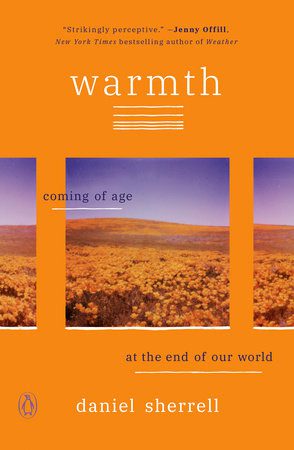Book Review by Brian Day
Warmth is a book I needed to be written. It is not a book about the science of climate change, projections for the planet’s future, or the specifics of what needs to be done to address rising global temperature. It is rather a book about living under the shadow of climate change—about how this crisis shapes our thoughts, our emotions and moods, and our attitudes toward both our current lives and our collective future. Daniel Sherrell is a young climate activist (born in 1990) who is marvellously perceptive and articulate about the complexities and contradictions of mood and thought that come with an acute awareness of the state of the world. His book is a memoir, an essay, and a letter addressed to his possible future child.
We accompany him in conversations with his family, through therapy, on a meditation retreat, on a writers’ retreat, and on a trek with Australian Aboriginals, as well as through his tightly scheduled days of organizing, protesting, and attempting to call attention to the state of the Earth. Like Jenny Offill’s novel Weather, Warmth allows us to see the workings of climate change not in the abstract but within the daily manifestations of a particular life. We feel the span of Sherrell’s uneasiness, outrage, grief, despair, empowerment, and hope. He expresses so much of the welter of what life consists of under the threat of climate change (which he refers to simply as the Problem).
With Zadie Smith, whom he quotes, Sherrell attempts to find ways to speak of the global crisis as also a personal crisis and to find its intimate and accurate language. This is the book’s essential contribution: providing a clear example of what it is to be a thinking, feeling person in a period of dire present and future threat. What Sherrell offers is a book of both lament and complex consolation: providing the solace of commiseration and a model for how to more fully give words to one’s own experience.
He recounts his fits and pits of grief, and he admits that he most often lives at a remove from the grief he knows to be commensurate with the state of the planet and its trajectory. He confesses the embarrassment and social awkwardness of speaking openly about the massive threat to our world. He explores the problems of agency, of being “stuck wielding localized ethics in the face of globalized problems,” the overwhelming scale of the Problem, and of the powerful forces arrayed against addressing it. He is sharply attentive to the way that climate change aims its worst effects at those who are most vulnerable, of how climate change is necessarily an issue of social justice. He presses toward an expansion of empathy, the inclusion of the neglected human and non-human participants in the world, and stretching from the
current moment both backward and forward and time.
Sherrell contends with the magnitude of what Timothy Morton calls the “hyperobject” of climate change: it being a matter too massive in its implications and duration for us to fully understand or integrate into our lives. He explores what it feels like “to tread the liminal ground between denial and resignation,” to negotiate a life of engagement between the two paralyzing poles of “We’re fine” and “We’re fucked.” With Joanna Macy, he acknowledges the need for profound sorrow in propelling resistance and activism. And while despair tempts and lures him, he rejects it, refusing to “accept the vision of our future as a single road leading to a burning city,” seeing it “more like a fan, stretching out in front of us in a swath of possible outcomes.” He refuses to collapse our future “into something as narrow as fate.” Sherrell rejects the choice of mourning or action, grief or resistance, aware of their necessary alternation and interdependence. He writes movingly of the need to love and attend to the world even as it dwindles, to “take heart in what’s left” and “lavish it recklessly with meaning,” and of the challenge and necessity of “fitting a hyperobject into your heart without breaking it.”
Warmth is an indispensable book, an immensely valuable articulation of the contradictions and complexities of living with the Problem, and what it might mean to approach the climate crisis with intelligence and heart. It provides a model of how to more fully think and speak about the crisis in ways that leave us not cowering or furtive, but more honest, more empathetic, and perhaps a little closer to being integrated. Sherrell presents ways of living with the climate crisis that does not leave us deadened in mind or heart but stirs us to live as he does: attentive, vulnerable, tolerant of ambiguity, and in community with others, both in our own time and in times to come.
Brian Day is a poet and retired elementary school teacher.

